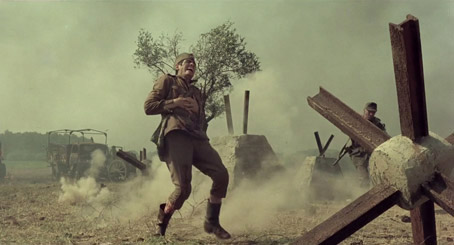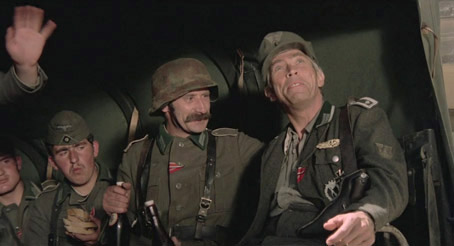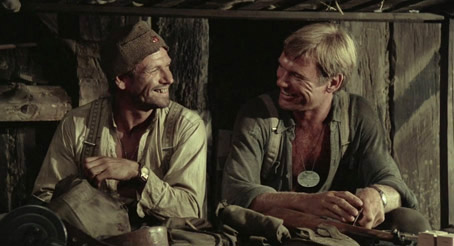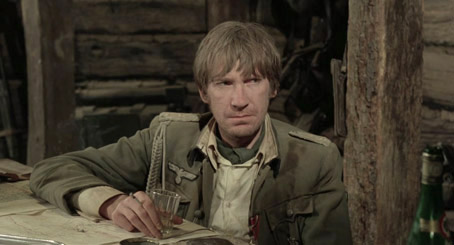| |
"I was told that I had that particular style and I said 'yeah, really?' Because you know, I couldn't care less, it doesn't concern me. I don't consciously work out anything. All my guts, all my life, everything I am is up there on that screen. So every morning you get up and you commit, you do the best you can, that's all. It's all there. It's right there. Everything I feel, everything I am, it's there." |
| |
Director Sam Peckinpah |
| |
"The German soldier no longer has any ideals! He is not fighting for the culture of the west, not for one form of government that he wants, not for the stinking party. He's fighting for his life, God bless him." |
| |
Colonel Brandt |
I, like a good many young male film fans of my generation, was initially drawn to the cinema of Sam Peckinpah by his reputation as a master of slow-motion violence. Of course, getting to see any of the films for which he was famous was a task and a half in pre-home video days, at least in anything close to their intended form. The Wild Bunch occasionally appeared on TV, but always in appallingly bastardised form, the cuts made to the violence and the pan-and-scan picture cropping transforming its showpiece action scenes into a bemusing mess. For years Straw Dogs was the stuff of excited rumour, while titles like The Killer Elite, The Ballard of Cable Hogue, Pat Garrett and Billy the Kid and Bring Me the Head of Alfredo Garcia were for this curious hopeful confined to the pages film books and magazines.
The first time I saw The Wild Bunch in a cinema, uncut and in all of its widescreen glory, I was stunned. The violence was startling, but what really caught me out was the beauty of the filmmaking – the fluid slow motion, the cross-cutting of action and the sort of lightning paced editing we had been repeatedly assured was impossible with the scope frame. The performances were superb, the cinematography sublime and the theme of men displaced by changing times was vividly and movingly explored. And this was no one-off, no sir. Peckinpah was a genuine auteur, one whose distinctive approach to all aspects of his filmmaking remained strikingly consistent throughout the second half of his career, despite the range of writers, cinematographers, editors and performers he worked with over the years. Many have attempted to walk in his footsteps, but few have come close to matching his artistry and mastery of thematic storytelling – Walter Hill (who wrote the screenplay for Peckinpah's 1972 The Getaway) came achingly close with The Long Riders and Southern Comfort, but the commercial success of 48 Hrs. subsequently took him in a different direction.

In the mid 1970s, by when his notoriously heroic alcohol intake was being supplemented by a similarly colourful consumption of drugs, Peckinpah famously turned down the chance to direct Superman and King Kong to instead helm what for many remains his last great film. Initially adapted by Julius Epstein from The Wiling Flesh, a novel by German author Willi Heinrich, it differed from the standard Hollywood war movie in telling its story from the viewpoint of German rather than American soldiers, most of whom were played by German actors who were relatively unknown outside of their home country.
The men at the story's centre – and like most war movies this is a very male-centric work – are a platoon of battle-hardened infantry soldiers stationed on the Russian front who have long ago cast aside any nationalistic ideals and are now fighting purely for their own survival. Commanded by the world-weary Colonel Brandt (James Mason) and his dishevelled and cynical adjutant Captain Kiesel (David Warner), the company's star soldier is Corporal Steiner (James Coburn), whose considerable skills as a field combatant prompt his immediate superiors to quietly tolerate his disregard for rules and open contempt for authority. Into this mix walks Captain Stransky (Maximilian Schell), a Prussian aristocrat who has requested reassignment to the Russian front in order to win the coveted Iron Cross. Fresh to the battlefield and pumped up on aristocratic notions of honour and duty, he clashes with Steiner from the moment they meet, and soon sees him as a barrier to his shallow military ambitions.
Given the subject matter and the director's track record, it's no surprise that the violence in Cross of Iron is intense and sometimes bloody, but it's also a crucial component of the film's thrust and tone and vividly captures the destructive mayhem of frenetic battle. Here combat is shown to be a confusion of bullets, explosions and desperate hand-to-hand fighting, enhanced by Peckinpah's signature cross-cutting and footage that alternates between hand-held reportage and pristine slow-motion, the energy and panic of the former dovetailing sublimely with the latter's ability to emphasise the impact of bullets and the destructive finality of death. The technique reaches a creative peak when Steiner attempts to rescue a fallen comrade and is brought down by an explosion – as he falls to the ground, the film's viewpoint switches from observational to a subjective, blink-of-an-eye cross-cut between Steiner's recent memories (one of which has tellingly altered), the explosion that brings him down, the hospital in which he wakes, and hallucinations involving people from both locations. Even the opening titles are a small storytelling marvel, a beautifully assembled montage of German wartime archive material cut to a blend of the children's folk song Hänschen klein and Ernest Gold's militarist main theme. Far from being merely decorative, it economically recounts the rise of the Nazi war machine, its defeat on the Russian front, and the increasing gulf between the ground troops and their glorious leader, and in a manner so deft it could almost be described as sleight of hand.

This is the front line experience from a staunchly proletarian viewpoint, with Stransky a symbol of the corrupt and cowardly ruling class that is directly opposed by the revolutionary Steiner. It's a conflict in which even well-intentioned officers like Brandt and Kiesel find themselves on the wrong side of the class war fence. They discover this for themselves when Steiner throws the opportunity to put an end to Stransky's false claims of bravery back in their face, responding to Kiesel's questioning of his gratitude with the contemptuous retort, "Do you think that just because you and Colonel Brandt are more enlightened than most officers that I hate you any less?" But Steiner's disdain springs not from political ideology but bitter experience and a genuine devotion to his immediate comrades, whose wellbeing and survival he places above all other concerns, including his own safety. They have become his family and the trenches his home, and it's to them he chooses to return even when offered a chance to walk away from the war with hospital nurse Eva, with whom he briefly becomes romantically involved. Steiner is drawn back like an institutionalised prisoner, and only in the company of his immediate comrades, with whom he drinks, swaps stories and philosophises about the war, is he ever really content.
It's in having his characters contemplate their situation, little of which appears in Julius Epstein's original script, that Peckinpah takes some of his biggest risks, but by allowing and even requesting contributions from the actors he also facilitates some memorable pay-offs. Steiner and Schnurrbart may quote Carl von Clauswitz – "War is a continuation of state policy by other means"* – with exaggerated theatricality, but the exchange leads to a moment of sobering contemplation that allows the film's understated questioning of the politics and consequences of war to register without being hammered home. It's an approach beautifully illustrated by the well-fed officer who attempts to shake hands with a soldier who has lost both arms in battle and is contemptuously offered a foot instead, and in the parting conversation between Brandt and Kiesel, which was devised on Peckinpah's request by James Mason and David Warner: "What will we do when we lose the war?" Brandt ponders to his adjutant, who tellingly replies, "Prepare for the next one."
In the disproportionate focus on his use violence, Peckinpah's considerable skill with actors is too often overlooked, and Cross of Iron is unquestionably one of the most impressively cast and performed. The epitome of the English gentleman he may have been, but James Mason makes for a most convincingly battle-weary Colonel Brandt, an authoritative yet approachable company commander whose dismay at the situation he and his men have found themselves in prompts a variety of emotional responses, from his quietly heartfelt farewell speech to Kiesel to his angry frustration at Stransky's naïve talk of ideals of the German soldier. Equally impressive is Maximilian Schell as the contemptible Stransky, a devious manipulator who buys the absolute loyalty of his adjutant Lieutenant Triebig (Roger Fritz) by threatening to expose his homosexuality, but who clearly lacks the metal to cope with the desperation of the Russian front, scuttling under a table during a mortar attack and proclaiming loudly his intention to continue fighting while wounded after receiving no more than a small cut to his face. His first meeting with Brandt and Kiesel is particular treat, with his self-satisfied confidence intermittently rattled by the explosions that rock the bunker, prompting physical jumps and accusatory upward glares, while his battle-hardened comrades barely raise an eyebrow.

The German actors that make up Steiner's platoon are uniformly excellent, and include the good natured and respected Lieutenant Meyer (Igor Galo), the wide-eyed and almost angelic-looking Anselm (Dieter Schidor), the Germanic faced Maag (Burkhard Driest) and the stressed out and flatulent Kern (Vadim Glowna). The film flirts with stereotype with the introduction of nervous young newcomer Dietz (Michael Nowka) and shark-faced party man Zoll (Arthur Brauss), but the former arrives too late to function as the standard audience identification figure, and Zoll is put quickly in his place by Steiner and meets a genuinely horrible end at the hands of Russian women's unit that the platoon encounters when on reconnaissance. My personal favourite has always been Krüger, deliciously played by Klaus Löwitsch – a scarred, lice-ridden and hardened survivor who wears a communist star on his hat, refuses to wash ("natural body oils, combined with dirt," he assures Steiner, "can keep you waterproof") and silences Kern's hysteria not with the traditional slap but by kissing him firmly on the mouth. It's only after a fierce bombardment of which he is the sole survivor that his fragile humanity is powerfully exposed, as he sits and shakes and stutters movingly to Steiner, "I don't ever want to be alone again."
And then there's the splendid James Coburn, whose distinctive voice, granite chiselled features and rebellious gait make him disarmingly easy to warm to, no easy task when his first on on-screen act is to lead an attack on a Russian encampment and describe the resulting deaths as a "good kill." Steiner's disrespect for authority is visible in every encounter with his military superiors, in every line he delivers and every look that he throws. Coburn is a master of suppressed emotion here, keeping his character's hatred in check but bubbling visibly beneath the surface in a manner you almost fear to see unleashed. As Kiesel tells Stransky at their initial meeting: "Steiner is a myth. But men like him are our last hope. And in that sense he is truly a very dangerous man." His relationship with a young Russian boy that his platoon takes prisoner and keeps hidden from Stransky is also delicately handled, sidestepping the obvious father-son overtones to focus instead on how war robs the young of their innocence and their future.

But of all the great performances here it's David Warner, in his few scenes as Captain Kiesel, who always beguiled me the most. Scruffy, cynical and perpetually unwell (Warner, apparently, went straight to the location from hospital), his worn-out weariness is clearly visible in every glance, every spoken word and every quiet moment of thought – even when sitting and seemingly immobile, Warner communicates so much through his look and posture. His introduction to Stransky is priceless – "Hello Captain, how are you?" Stransky asks him politely, to which Kiesel replies, "Thank you for asking, Captain. I feel terrible. I have diarrhoea. How are you?" – and the emotional kick of his and Brandt's parting stems in no small part from his desperate unwillingness to leave and his heartbreaking expression when he waves his driver to transport him away. I get a lump in my throat just thinking about it.
It's true that the film never really tries to resolve the contradiction of delivering an anti-war message between scenes of combat that are genuinely thrilling to watch, but this also neatly reflects the dichotomy of a central character who is defined by a war but who holds its aims and commanders in the lowest contempt. It's one of many fascinating elements of a film that is chock full of them, a brilliantly shot and edited work whose thematic complexity, rich character detail, superb performances, unexpected humanity and structural boldness (how many other war films would put the main story on hold to follow its lead character to hospital and explore the hallucinatory effects of his head injury?) are every bit as rewarding as its dazzlingly executed battle scenes. It's perhaps no surprise that Stransky proves to be every bit as cowardly and dishonourable as we initially suspect, and there's an inevitability to his climactic confrontation with a vengeful Steiner, but even here Peckinpah refuses to play to expectations or convention, developing the encounter into a semi-comical and surreal final scene and an end credits sequence that recalls Georg Hegel's famous proclamation that the only thing we learn from history is that we learn nothing from history. Others will disagree, and they're free to do so, but for this humble viewer Cross of Iron stands as one of Peckinpah's most divinely realised works, and one of the most dramatically satisfying and artistically thrilling war movies ever made.
The news that Cross of Iron was coming on Blu-ray with a brand new transfer and a bag full of extras had me genuinely excited. How would the film look on HD, digitally restored from what we can assume was the original negative? Well there's good news and not so good news, which you may just have picked up on from the screen grabs above. The good news is that in terms of picture detail, the film is a massive leap over any previous home video version and really justifies the decision to release the new transfer on Blu-ray only. The problem is that someone involved in the restoration process, presumably taking their cue from photographs of the period, has decided add a sometimes overpowering sepia tint to almost the entire film, a colouration that you'll not find on any previous DVD or video version and that was certainly not present in the version I saw at the cinema. Not only does this drain John Coquillon's superb cinematography of most of its colour, it's also been inconsistently applied – during the Russian assault on the bunker after Steiner and his platoon have been abandoned by Stransky, the degree of colouration varies from shot to shot and is completely absent from the images of attacking aircraft against a clear blue sky. Inevitably, this means that black levels tend to be rendered as dark brown and that brightness is sometimes reduced, but in other respects the contrast is generally well judged. It may well be that some Peckinpah scholar will assure me that this was how the director originally wanted it to look, but I'm not buying it for a second – unless the director himself approves such changes to the release print then it's all speculation on the part of someone who was not involved in the original production and who frankly would have done better to leave well alone. The jury's still out on whether the original ratio was the European favourite of 1.66:1 or the 1.85:1 employed here.
A colour comparison between the previous Studio Canal DVD (top)
and the Optimum Blu-ray under review here (bottom). The level
of detail on the Blu-ray is far superior, however. |
|
|
|
|
Both the original English language track and the German dub are available, although the selection between them has to be made before you get to the main menu (you can still switch between them using the audio button on your remote). Somewhat surprisingly, the English track is linear PCM 2.0, while the German dub is DTS-HD Master Audio 2.0. Apparently both are stereo but the separation is barely detectable. The dynamic range is some way short of the modern standard, but dialogue, music and sound effects are clear and distortion free on both tracks. It's worth noting that the German track is scored slightly differently and has music where there is none on the English language original.
Some of the special features included here appear to have been taken from the German 2-disc DVD release, Passion & Poetry – The Ballad Of Sam Peckinpah, which gets a small plug at the end of each extra. This does mean that none are in high definition and that several are letterboxed within a 4:3 frame. Fortunately, they are rather good. What isn't present is the audio commentary by film scholar Stephen Prince, author of Savage Cinema: Sam Peckinpah and the Rise of Ultraviolent Movies, that you'll find on the American Hennstooth DVD release, a disc whose transfer is probably the worst I've seen of this particular film.
Passion & Poetry: Sam Peckinpah's War (46:07)
A very decent documentary, directed by Mike Siegel, that mixes archive material from a variety of sources with newly filmed interviews to tell the story of the film's sometimes bumpy production. There are plenty of interesting stories here – a favourite has Peckinpah, unhappy with the Yugoslav food, buying a cow and cooking up steaks for everyone – and considerable praise for the director from the actors, while Peckinpah speaks with some awe at having the chance to work with "Mr. James Mason," and takes understandable pleasure from the letter he received from Orson Welles telling him that Cross of Iron was one of the greatest war movies he'd ever seen. Inevitably there's some coverage of Peckinpah's drug taking and drinking, with James Coburn (a terrific interviewee) explaining how he helped him to kick the habit, and Senta Berger recalling an unusual final encounter with him shortly before he died.
On Location is a collection of five on-set audio interviews conducted with Sam Peckinpah (5:15), James Coburn (5:39), James Mason (6:14), Maximilian Schell (4:44) and David Warner (3:24), substantial extracts from which appear in the above-detailed documentary.
Krüger Kisses Kern (8:37)
Actor Vadim Glowna, in what plays like a cut scene from the above documentary, engagingly recalls his explosive first meeting with Peckinpah and how his rewrite of the birthday party scene ended up being filmed without most of his fellow actors being aware of how it was going to play out.
Letters From Vadim & Sam (3:58)
A slow tilt down a letter from Vadim Glowna to Peckinpah that is discussed in the previous featurette, plus a return letter to Glowna in which Peckinpah apologises for his delay in writing back because "I was so locked into Convoy, still believing I could pull it out of the shit it was stuck in."
Vadim & Sam: Father & Son (5:58)
Vadim Glowna recalls visiting Peckinpah during editing and and expressing his admiration for a sequence he was shown, only to have the director scream at how bad it was and call him an arsehole, a falling-out that was later firmly patched up.
Cutting Room Floor (4:23)
An insubstantial featurette in which actors Roger Fritz, David Warner and Senta Berger talk briefly about scenes that were cut from the film, when what we really want is to see the missing footage.
Steiner in Japan (2:02)
Some Japanese poster artwork and press material, plus two cheesy commercials for Rockingham fashion starring Coburn that, we are led to believe, were directed by Peckinpah. Not work that should feature on the CVs of either men.
Mike's Home Movies: Steiner & Kiesel Meet Again (7:26)
A screening of Cross of Iron at a Peckinpah retrospective in Padua in September 2000 is introduced by James Coburn and David Warner, who recall some fond memories of the shoot, particularly Peckinpah's method of creating smoke and the way James Mason would create the impression of doing very little in front of the camera and then blow them away when they saw the rushes.
Rounding things off are a rather clunky German Trailer (3:21), where you can see how the colours used to look, an American TV Spot (0:39), and the USA/UK Trailer (3:52), which gives a little too much away to be watched just before the film.
Oh is this frustrating. This should and indeed could have been an primo release – the film has been digitally restored and transferred in HD and the level of detail and picture stability far outstrips any previous home video version. So why oh why has the picture been stripped of most of its colour and stained like it was dropped in a bath of brown chemicals during the processing stage? I'm getting really fed up with the post-mortem digital tinkering of films by people who were not involved in the original production but still have their own ideas about how the film should have looked. This was not a monochrome film, but much of it has effectively been rendered as such by the colour tinting here, which seriously interfered with my enjoyment of the film. I thus so want to cheer for this Blu-ray release of one of my favourite movies for what it gets right, but I'm tempted to hang on in the hope that the film will one day be re-released with the original colour palette restored. If the colour issue doesn't bother you (and it really should) then there's plenty to recommend the disc otherwise.
* The actual quote is "War is not merely a political act, but also a political instrument, a continuation of political relations, a carrying out of the same by other means."
|